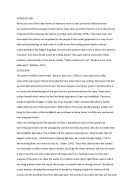The use of onomatopoeia like “trudge” emphasises the slowness of the soldiers, and the laboriousness of their task. This creates the impression that the soldiers are weary of war and no longer see a purpose to it.
Word count: 150
Question 3
(a) In no more than three sentences, give your interpretation of the meaning or meanings of the poem.
This poem is fundamentally a warning to people not to tell lies about the glory of war and dying for one’s country. The narrator asks the reader to understand the consequences of that lie by forcing them to witness a soldier’s death. I believe the narrator is attempting to rekindle a value and respect for human life which was lost during the First World War.
(b) In no more than two sentences explain how the context helped you to understand the poem.
The poem was written in 1917 during World War 1 and probably directed at the English writer Jessie Pope who was famous for encouraging men to go to war and scorning those who did not. This was a time when young boys and men were going to war, believing it to be their duty but also the only way to distinguish themselves in a society obsessed with glory and honour.
(c) In continuous prose (that is, in paragraph form rather than bulleted points or notes), write an account of this poem, showing how the techniques used create the effects that lead to your interpretation of the meaning of the poem. Use no more than 500 words in your answer.
This poem is an illustration of the reality of war; it seeks to contradict the glorification of war by confronting the reader with a horrific account of death witnessed by the poem’s narrator. The glorification of war is reflected by the Latin proverb “Dulce et decorum est pro patria mori” which was taught in schools and used as propaganda in the early twentieth century to encourage young men to die for their country.
The first stanza of the poem employs an ABABCDCD rhyme scheme; the resulting effect is an impression of momentous and almost relentless beats, like drums of war keeping the pace of soldiers marching into battle. This slow rhythm of beats is used to illustrate how slow and drawn-out the war was as well as to demonstrate the inescapability and ultimate futility of war. It also implies the narrator is trapped and is being carried against his will towards his fate. The use of the hard k sounds (“sacks“, “knock”, “coughing” and “cursed”) mimics the sound of coughing and implies the soldiers are sick, but the hard k sound also resembles the sound of machine guns being fired over the heads of the soldiers.
The pace increases rapidly in the second stanza, “Gas! GAS! Quick, boys!” sets the tone of this stanza by highlighting the urgency and danger of the soldiers currant situation. The gas which is referred to is the now notorious mustard gas which was used as a chemical weapon during the First World War. When exposed to the lungs it created large blisters causing respiratory failure. The narrator describes the soldiers as “fitting the clumsy helmets just in time”, suggesting that despite the soldiers apparent fatigue they are compelled to act quickly to save themselves from the immediate danger of the gas. The narrator describes a soldier “yelling out” as if for help and “stumbling” as if the soldier were desperately looking on the ground for his mask. The narrator separates this soldier from himself “as under a green sea”, creating an immovable barrier between them to illustrate the fact that the soldier is beyond help. The image of a man “flound’ring” and “drowning” in a green sea implies a painful and terrifying death which is nothing like the ‘lovely’ death described in Horace’s famous quote, Dulce et decorum est.
Owen deliberately tries to shock the reader through his description of the unfortunate soldier in the fourth stanza. The dying soldier’s physical appearance is described in vivid and graphic detail, the use of alliteration such as “watch the white eyes writhing in his face” emphasises the appalling and grotesqueness of the scene, it also suggests the narrator is haunted by those eyes. The reason why Owen tries to shock the reader is clear, he hopes to inform the reader and make them understand the true nature of war.
Word count: 473
References
O’Day, R., Hardy, W., Marsh, G., Padley, S. and Perryman, L.A. (2011) Making Sense of the Arts, Milton Keynes, The Open University.
Task 2
1. What did you find easiest and what did you find most difficult about doing this assignment? Why was this?
I found researching the poem and understanding it’s meaning easiest, although I did not expect to. One possible reason was because I was interested in the subject matter so I was more willing to research things.
I found forming a coherent essay structure which flowed well particularly difficult and I do not think I have achieved this. One reason for this is that I do not write regularly.
2. What could you do to make the difficult area easier in the future?
I will allow more time to do the writing activities in the course book.
Word count: 82








